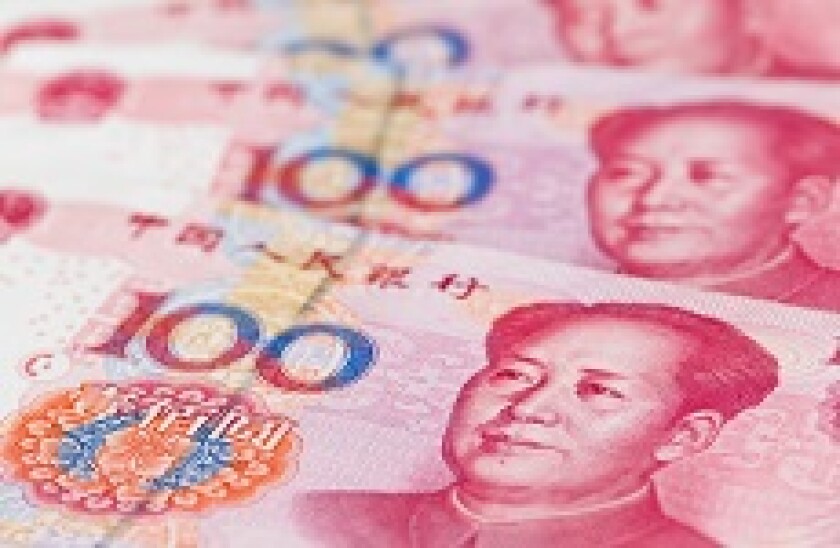The CNH market has been through a quiet spell of late. However, with the depreciation of the Chinese currency making swapping renminbi into dollars cheaper, the lower funding costs and added bonus of investor diversification could resuscitate the offshore market.
Last year was a bumper year for the CNH bond market, thanks to an ever-increasing deposit base and investors seeking to take advantage of the currency’s appreciation. A total of 140 deals worth Rmb226bn ($37bn) poured into the market in 2014, a big leap from the Rmb114bn in 2013, according to GlobalRMB.
But 2015 has started rather sluggishly, with only 10 deals worth Rmb11bn so far (see table).
While Chinese issuers are usually the most frequent group in the market, with 86.3% of issuance last year, they have been mostly absent so far this year.
Out of the 10 CNH deals priced this year, Dalian Port was the only Chinese issuer, raising Rmb800m from a 4.5% three year bond this week. But it only came to the market as one of the two standby letters of credit it had obtained from Agricultural Bank of China Dalian had to be drawn down before Chinese New Year.
The absence of Chinese issuers and the slowdown in CNH issuance can be attributed to a rise in funding costs. The average yield on dim sum bonds, for example, has climbed by more than 100bp over the past 12 months to around 5.3%, according to Citi’s Dim Sum (Offshore CNY) Bond Index.
High CCS
The rise in borrowing costs is driven by volatile dollar-renminbi cross-currency swap (CCS) rates, which have jumped in recent months and are hovering around record highs.
For the past few weeks, the three year CCS has climbed steeply, to 3.86% on February 10 and 4.13% on February 12. It was 3.4% on January 29.
The up-trend of the CCS, in turn, is the result of renminbi depreciation, which was deepened by the European Central Bank on January 22 unveiling the plan to buy €60bn ($69bn) of assets a month from March 2015 until at least September 2016.
“Because the euro is expected to depreciate, the global market moved from euros to other safe haven currencies such as dollars. The dollar has appreciated as a result, which in return has depreciated the renminbi,” said a banker in Hong Kong. “It has sped up the renminbi depreciation, which was already going on due to the slowdown in the Chinese economy.”
The dollar was worth Rmb6.2448 on February 12, compared to Rmb6.1342 on January 22.
Meanwhile, renminbi weakness has been worsened by redemption pressure and the liquidity pinch in the CNH market.
“These factors raised swap rates so quickly in such a short period of time and will remain high until the second quarter when offshore renminbi liquidity is eased and heavy redemptions are slowed,” said a fixed income researcher in Hong Kong.
Cheaper costs
While the rise in headline yields has scared many Chinese issuers away from the offshore renminbi market, other issuers outside the country are starting to take advantage of the increase in the dollar-renminbi swap rate.
Export Import Bank of Korea, for example, saw an opportunity on February 10 when the three year swap hit 3.86%. It raised Rmb1bn with a 4.4% three year bond.
On the surface, that looked a fairly expensive deal for Kexim, since it had tapped the same market for Rmb800m less than two weeks earlier with a dual trancher that comprised a 4.05% 2020 and a 4.2% 2022.
However, the elevated swap rate actually allowed the issuer to come inside its dollar curve by around 10bp. (See separate story).
“What is most important for us is how much the trade can save, compared to our existing dollar curve, and with this trade we managed to achieve that objective,” a Kexim treasury official said.
What’s next?
While companies that have a need for renminbi will probably be unable to benefit from the swap, market participants agreed that non-Chinese issuers such as Kexim have a lot to gain from doing so, especially when the swap rate is likely to remain high.
“First they can cut funding costs, and second, they can expand their investor base and build up profile in China as well. What is there not to like?” said a syndicate banker in Hong Kong. “I think offshore names, especially policy banks and quasi-sovereign credits who constantly need to diversify their investor bases, will be encouraged to follow in Kexim’s footsteps.”
As a result, one debt capital markets banker in Hong Kong believes that, unlike in previous years, the renminbi market in 2015 will instead be driven by non-Chinese names. And it will be investment grade names leading the way.
“The offshore renminbi market is still uncharted territory for foreign credits, and as for other unknown markets, strong issuers will have to tap the market first,” the DCM banker said.
He added that issuers rated above BBB will have the best chance of benefiting from this approach, since they are usually the ones investors are most comfortable with.

